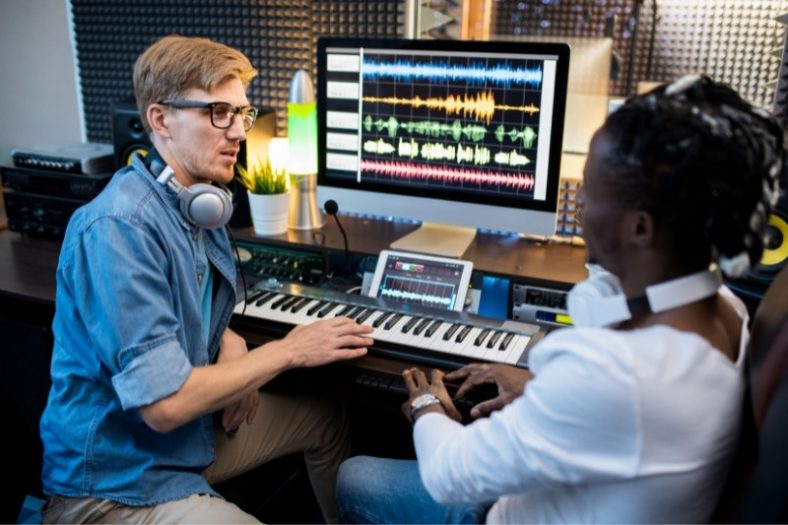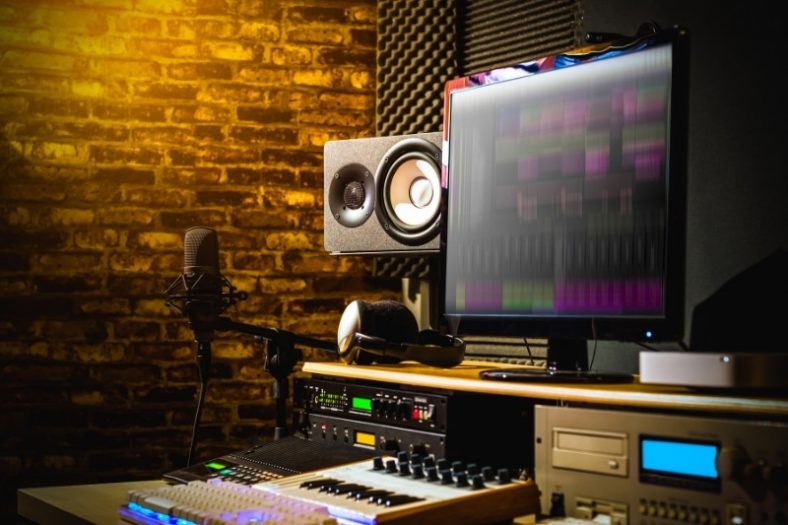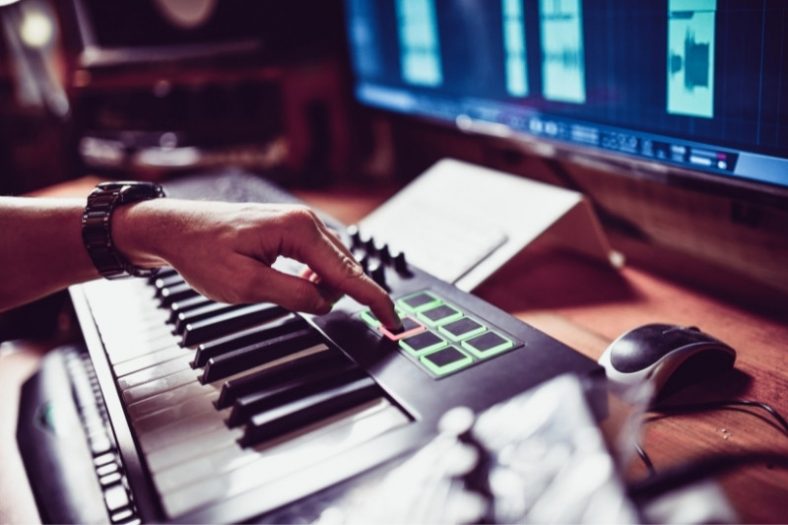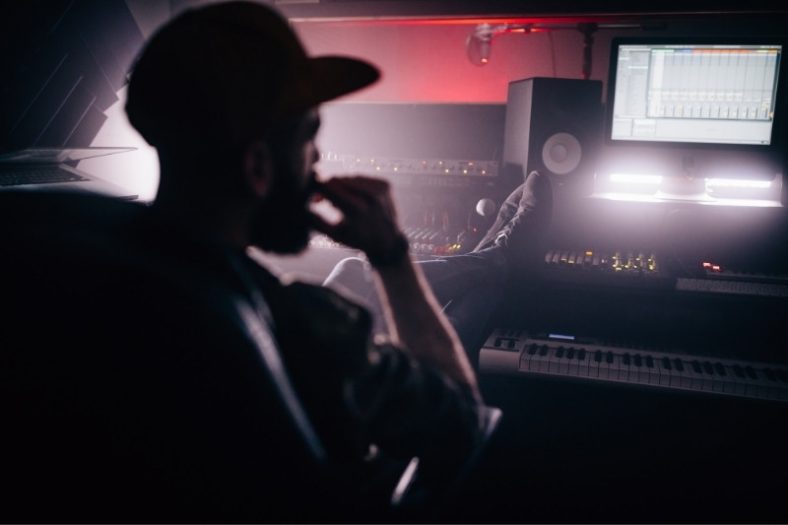20 Ways to Make Money as a Music Producer

There are several methods to earn money as a music producer, but it all comes down to finding the one that works best for you. It’s a common ambition for every artist to live their passion and turn it into a career with a steady stream of income.
The music production industry has become an evolved field with so many financial stream options available to approach as a music producer.
Although it takes a lot of work and creativity, the options for music producers to build a financially viable career are bright. This article explores the various domains that allow music producers to make a living off their talent.
Later in the post, we also discuss 5 great tips for earning money as a music producer.
Contents
- 1. Earning from Royalties
- 2. Produce for Other Artists
- 3. Mixing and Mastering Services
- 4. Earn as a Ghost Music Producer
- 5. Utilize your Home Studio Setup
- 6. Make Money from Sample Packs
- 7. Make Revenue by Selling Beats or Instrumentals
- 8. Music Licensing
- 9. Live the Touring Artist Life
- 10. Earn as a Club DJ
- 11. Commercial Gigs
- 12. One-to-One Teaching
- 13. Share the Knowledge through Online Platforms
- 14. Create Online Courses
- 15. Patreon and Crowdfunding
- 16. Monetize Your Content
- 17. Promote Sales Through Social Media and Email Lists
- 18. Make Use of Freelancing Platforms
- 19. Explore the Video Game Music Niche
- 20. Sell Merch
- 5 Tips when Making Money as a Music Producer
- Summary
1. Earning from Royalties
The ideal and most straightforward financial flow for any music producer or an artist is in the form of royalties. If you produce music that is high quality and garners appreciation among the audience, then music royalty will quickly become your significant chunk of income.
Becoming a sellable artist is almost every producer’s dream, and to earn the royalty of their creation is the ultimate destination for many. However, it is incredibly crucial to understand the intricate web of music royalties.
Music royalties that generate earnings for music producers are either Mechanical royalties or Performance royalties. Every time an artist’s track is downloaded through various streaming channels or played on a streaming app; they earn a pre-negotiated cut which is referred to as mechanical royalty.
Whereas performance royalty is generated every time, the artist’s track is aired or performed on media such as television, radios, and music festivals. The royalties for music producers and artists are majorly generated from digital streaming mediums such as iTunes, Spotify, Apple Music, and Beatport.
The steps to becoming an artist whose income source is their music royalty are relatively simple at its core; since you create music and distribute through various available channels or independently.
However, making a lot of money through royalties is no easy task. It requires a complex permutation of skill, talent, luck, and most importantly, time!
If you don’t have your tracks up on online stores and streaming platforms, then consider doing that soon. Check out our article on how to get your music on Spotify and iTunes for free.
2. Produce for Other Artists

If you have the skill, expertise, and trained ears required for becoming a high-caliber music producer, then you can be the next Max Martin to an up-and-coming pop star.
Artists often hire music producers to deal with the technical aspects of recording and production.
Therefore, you can earn a decent income in return for your services as a music producer to help the singers weave fascinating sounds in their tracks.
This route ultimately helps music producers to build a rich portfolio of their collaborations and can be useful in securing more profitable gigs and clout in the industry.
3. Mixing and Mastering Services

This next financial opportunity will be right up your alley if you are skilled at mixing and/or mastering.
Mixing and mastering is the final step to develop a cohesive and polished album arrangement; that’s where you can utilize talent and offer your services.
Sound engineering is a highly intuitive process that is a natural career path for many music producers and to make some earnings.
Mixing and mastering professionals are one of the most sought after individuals in the industry for their skills and expertise; therefore, if sound engineering is something that you enjoy, then this could bring you some economic stability.
Keep in mind that although mixing and mastering use many of the same tools, they are very different processes. If you are particularly good at one then it might be good to specialize in that job so that you offer the best service.
4. Earn as a Ghost Music Producer
Ghost music producers create music for other producers. In doing so, the ghost music producers do not get the credit for their creation, but they are compensated in terms of monetary benefit.
As a music producer, you can make new tracks and sell them off to other music producers as a means of side income.
There are many ghost production platforms where you can offer your services, for instance, EDM Ghost Producers, House of Tracks, and Your Ghost Producers.
As a musician, if watching your original work credited to others does not bother you, then you could earn as a ghost music producer.
5. Utilize your Home Studio Setup

Many passionate producers set up elaborate home studios, which can be used for a steady cash flow.
For a reasonable fee, you can allow artists to record their tracks in the comfort of your home studio. This method is an efficient way of making use of your available resources.
6. Make Money from Sample Packs
Every musician wants an arsenal of sounds that they can transform to create impactful and mesmerizing tracks.
The sample packs niche is an offshoot branch in music production that can be profitable. Sample packs are a collection of one-shot and loop samples of various instruments and genre styles that are recorded with microphones, live or virtual instruments.
Sample packs come in multiple variations, such as sample loops, vocal or drum samples, one-shot libraries, and presets. Not every music producer wants to invest time and effort to create customized, unique riffs, tweaks, samples, and one-shots. Therefore, selling sample packs can be a good option for you.
The music producers can either make their sample packs available on their websites or online store. There are many other platforms through which you can sell your sample packs, such as Splice and ADSR.
7. Make Revenue by Selling Beats or Instrumentals

There is a massive demand for beats and instrumentals from artists, singers, and rappers; therefore, as a music producer, this is another niche that you can cater to.
Music producers with interest in electronic dance and hip hop music genre can churn out beats that they can sell to make an earning for themselves.
As an artist, if you can produce high-quality and engaging beats, then you can have a steady income source. All you have to do is create beats and instrumental tracks that fancy the imagination of your clients.
Platforms like Airbit and Beatstars can host your creations and reach out to your potential clients.
8. Music Licensing
Music licensing or sync licensing is a remarkably rewarding niche for music producers. Music producers today produce cues, instrumentals that play on tv, commercials, and movies that generate income.
Whenever your track is played in a show or movie or on any other media platforms, then you are generating income given the licensing on your tracks.
There are licensing companies such as Sound Stripe, Audio Jungle, and Marmoset Music that bridges the music producers and enterprises who need background scores for their shows, movies, and commercials.
9. Live the Touring Artist Life
If performing on stage is something that fascinates you, then live performances and music tours can be your natural career progression as a music producer.
However, to get considerable profits as a touring artist, it’s crucial that your music hits home for the audience, and you have the right people to promote your performances.
Breaking in as a touring artist can be a bit daunting initially, but if you market yourself ingeniously, then tour life would bring you a cash flow along with fame.
10. Earn as a Club DJ

Music production and DJing often go hand-in-hand. Branching out to the role of club DJ will add as a great supplemental income to your pocket.
You can start small when breaking into the DJ-ing scene by reaching out to local clubs.
However, once you build clout and reputation for yourself, you’ll be able to perform in the jazziest and swankiest clubs of your city, given that you bring skill and innovation to the turntables.
11. Commercial Gigs
Commercial DJing isn’t as glamorous as music production or club DJing. However, commercial DJing isn’t too demanding and makes up for a decent income.
This sort of DJing includes weddings, parties and events and does not require too much heavy lifting and efforts on your part.
12. One-to-One Teaching
When you have the knowledge and experience of years in the industry as a music producer, there will be many who’d be willing to learn from you. So, another great option to earn some bucks is by teaching others what you know.
There are many aspiring music producers who would love a chance to learn from someone who is skilled in the field. Music theory is not something that could only be taught in music schools.
Since it is a process that comes with practice, you can leverage your skill and experience by providing one-on-one coaching to music aspirants.
Nowadays, you have access to various teaching media from face-to-face to online video chats.

Music production is an extremely engaging and interesting process that fancy the imagination of music enthusiasts.
As a music producer, you have a great opportunity here to inspire people in the process of production that could result in gaining more exposure among the right audience.
This includes writing music-related articles for online platforms. Blogging and writing articles adds to your profile and clout which would lure more clients towards you for more services and collaborations.
You could become a paid writer for other blogs, or you could start your own blog and promote your other services.
14. Create Online Courses
There are numerous popular platforms to promote and earn from online courses. To make some earnings on the side, you can efficiently make use of Udemy and Coursera.
These are two platforms where you can sell your structured courses on various concepts and tutorials regarding music production process.
If the courses contain valuable information and strike a chord with audiences, then you have supplemental income coming your way in no time.
This is very different from one-to-one teaching. Creating online courses is much more on the line of ‘passive income’. You do most of the work up-front and reap the benefits later on.
15. Patreon and Crowdfunding
Exchange of knowledge is a very rewarding process and platforms like Patreon are doing just that. You can share your knowledge through Patreon, where your contributors pay for the resources and teachings you provide them.
As a music producer whose work has gained recognition among dedicated supporters and followers; Patreon can translate into another supplemental income source. Many artists contribute their resources on Patreon for a sum of monetary support from their followers.
Therefore, the options are endless through which you can earn bucks for imparting your knowledge to others.
16. Monetize Your Content
YouTube has grown into a multifaceted, monetized platform.
Many musicians leverage the YouTube by making their channels where they document their journey and feature their productions to a wider audience. YouTube allows content creators to monetize their videos.
So, if you are uploading engaging music and content such as tutorials and covers that attract viewership then you are not only earning, but this exposure might also open more opportunities for you.
If you have a blog with a lot of traffic, you can also place ads on the website to get a bit of extra money.
17. Promote Sales Through Social Media and Email Lists

Most people stream music nowadays, but your best fans might be very happy to buy your tracks from platforms like bandcamp and itunes.
We don’t even need to stress how important social media leveraging is for creative professions. Also, email lists might sound old-fashioned but they are one of the best ways to get in contact with fans. They are also the only medium in which you are almost fully in control of the communication.
18. Make Use of Freelancing Platforms
If you have a decent home studio and DAW then you can easily make some earning from freelancing platforms.
Fiver and Upwork have so many clients who require musical assistance for their projects, websites and startups.
You can apply for projects on short term basis and get paid upon completion. From background scores for short films to editing and many other music-related jobs are available on such platforms.
19. Explore the Video Game Music Niche

Video game development includes many musical elements such as background scores and sound effects. The video games industry is a booming niche that is growing rapidly.
Many game developers look for music producers who can come up with original soundtracks for the games to generate hype among the users. Developing game music is an extremely easy gig for skilled music producers since most of it includes sound effects within gameplay and background score.
To branch out into this niche, you should have some high-quality samples to reach out to the developers and successfully land a gig.
20. Sell Merch
Merchandising has gained incredible momentum as it is more than just an autograph.
Merchandised products encourage fans and followers to support their favorite artists and creatives. You can design customized clothing items, mugs and keychains to sell and make some bucks from it.
You can even use ‘print on demand’ services such as printify if you don’t want to buy merchandise in bulk. If you start to sell a lot of merchandise and don’t want to deal with shipping, you can use services such as Amazon Fulfilment to handle shipping and returns.
5 Tips when Making Money as a Music Producer

1. Become FANTASTIC at Your Craft
If you’re just starting out with music production, then you are far too early to be looking to make money from it. Music production is a highly competitive field, you should make sure that you are skilled and experienced in this area before you get started.
You could potentially make money from producing music early on. However, you should limit your expectations and not plan on leaving your job just yet!
2. Leave Time for Your Passion Projects
If you want to be a world-famous artist, then you need to give enough time to creating and promoting your own tracks. If you are stuck on finishing projects for other people, it might sap your energy away from focusing on what matters to you.
How you strike the balance is totally up to yourself. If you find it difficult to produce your own music after working on a time-consuming commercial project then you should carefully think if it’s in your interest to take on the extra projects. If you’re struggling for money, perhaps there are alternative projects or income streams that you could go after instead.
3. Be Very Patient and Resilient
Starting up any new income stream can take a lot of time, but it may eventually be worth it. It could take 10 times longer than you expect and 10 times the amount of effort!
I’m not trying to scare you off. I am just giving you prior warning that you need to make decisions for the long-term to set yourself up for success.
If you are working on freelancing platforms then, unfortunately, you may have to take on low-paid projects at the start to build up good feedback on your profile. It also takes much longer to win your first project because you have not proven yourself yet, so you may need to spend many hours applying to jobs. You will also probably have to be less picky about jobs initially.
That might all sound terrible, but again, it can be worth it in the end. After you have proven yourself then you can raise your rates, work with long-term clients, and have some great financial freedom.
The route to success varies greatly across each of the income streams in this article. However, every one of them requires patience and resilience to be successful.
4. Develop a Great Working Routine
If you are not used to working by yourself then you should be strict about creating a routine that’s positive for you.
Some useful tips (these may vary greatly depending on your needs or preferences):
- Schedule your working time (e.g. early in the morning, a few hours in the evening): Try to strike a balance with your work and life so that you don’t start burning out.
- Get some exercise: Starting a new income stream requires energy and a clear head. When you’re feeling tired or frustrated, take a break and get some exercise. Even something as simple as a brisk walk can do the world of good.
- Make a plan and stick to it: How much money to do REALLY need to make from music production? Try to plan out how you might make this from each income source. How many hours do you need to work on a daily basis? How many weeks or months will it take to set up that income stream? What steps do I need to take on a daily basis that will make it happen?
Of course, that’s not a definitive list, but if you do each of the steps above then it will be a great start!
5. Find Opportunities in the Real World
There are many ways to earn as a music producer, but it can be quite difficult to start it all by yourself.
Meet new people, make new friends and exchange ideas. The musicians and artists that you meet today might be your clients or collaborators tomorrow. They might also be a very positive support network for you to help you get through any challenges in your music production career.
Perhaps you could volunteer or get a part-time job in a local recording studio or radio station. You could DJ for free at events and eventually get paid to do it. During all of this, you are building up experience and meeting new people.
Summary
The music production game is not an easy one. It is saturated with people that desperately want to make a living from it. However, if you can put in the hard work then it is very possible. There are many creative ways to make money from this skill.
Look through the 20 points above again and ask yourself which ones you want to pursue. You could work on a few of them but don’t try to bite off more than you can chew. Then try to think about how those income streams apply to you by reading the advice in the ‘5 Tips’ section above.
This list is never going to be definitive. There are always new opportunities and ideas out there. Start getting to know other producers, join communities online and be on the lookout for new ways to earn from your craft.
Good luck! If you have any other ideas then be sure to share them below.





